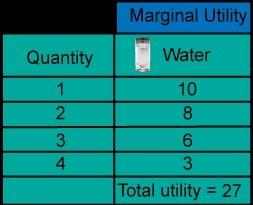
Business, 13.03.2020 23:30 pastmarion
Suppose you have decided to spend the summer working as a house painter with two friends. You each handle a different aspect of the business, and you have collectively decided how much to pay each person after material expenses. At the end of the summer, there is money left over. According to a Marxist analysis, the leftover money would be considered:

Answers: 2
Another question on Business

Business, 21.06.2019 19:40
Bear, inc. estimates its sales at 200,000 units in the first quarter and that sales will increase by 20,000 units each quarter over the year. they have, and desire, a 25% ending inventory of finished goods. each unit sells for $35. 40% of the sales are for cash. 70% of the credit customers pay within the quarter. the remainder is received in the quarter following sale. cash collections for the third quarter are budgeted at
Answers: 3

Business, 22.06.2019 01:20
Suppose a stock had an initial price of $65 per share, paid a dividend of $1.45 per share during the year, and had an ending share price of $58. a, compute the percentage total return. (a negative answer should be indicated by a minus sign. do not round intermediate calculations and enter your answer as a percent rounded to 2 decimal places, e.g., 32.16.) b. what was the dividend yield and the capital gains yield? (a negative answer should be indicated by a minus sign. do not round intermediate calculations and enter your answers as a percent rounded to 2 decimal places, e.g., 32.16.)
Answers: 2

Business, 22.06.2019 07:50
In december of 2004, the company you own entered into a 20-year contract with a grain supplier for daily deliveries of grain to its hot dog bun manufacturing facility. the contract called for "10,000 pounds of grain" to be delivered to the facility at the price of $100,000 per day. until february 2017, the supplier provided processed grain which could easily be used in your manufacturing process. however, no longer wanting to absorb the cost of having the grain processed, the supplier began delivering whole grain. the supplier is arguing that the contract does not specify the type of grain that would be supplied and that it has not breached the contract. your company is arguing that the supplier has an onsite processing plant and processed grain was implicit to the terms of the contract. over the remaining term of the contract, reshipping and having the grain processed would cost your company approximately $10,000,000, opposed to a cost of around $1,000,000 to the supplier. after speaking with in-house counsel, it was estimated that litigation would cost the company several million dollars and last for years. weighing the costs of litigation, along with possible ambiguity in the contract, what are three options you could take to resolve the dispute? which would be the best option for your business and why?
Answers: 2

Business, 22.06.2019 17:30
Jeanie had always been interested in how individuals and businesses effectively allocate their resources in order to accomplish personal and organizational goals. that’s why she majored in economics and took on an entry-level position at an accounting firm. she is very interested in further advancing her career by looking into a specialization that builds upon her academic background, and her interest in deepening her understanding of how companies adjust their operating results to incorporate the economic impacts of their practices on internal and external stakeholders. which specialization could jeanie follow to get the best of both worlds? jeanie should chose to get the best of both worlds.
Answers: 2
You know the right answer?
Suppose you have decided to spend the summer working as a house painter with two friends. You each h...
Questions


Chemistry, 26.01.2022 14:00

Social Studies, 26.01.2022 14:00







Social Studies, 26.01.2022 14:10





Social Studies, 26.01.2022 14:10




Mathematics, 26.01.2022 14:10

English, 26.01.2022 14:10




